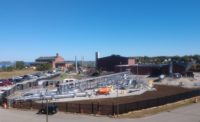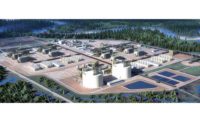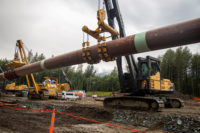Developers of a hotly contested $4.5-billion natural gas pipeline in northern British Columbia are rejecting alternative routes amid nationwide protests that have crippled the Canadian rail system and triggered a political crisis.
Wet'suwet'en hereditary chiefs, who are battling plans by developer TC Energy to build the 416-mile Coastal GasLink pipeline through their tribal territory, have been pushing an alternative, the so-called McDonnell Lake route that they contend would steer clear of sensitive cultural and archeological sites.
Other indigenous peoples and environmental activists across Canada have taken up the tribe’s cause, blocking national rail lines as far east as Ontario and Quebec, and forcing Prime Minister Justin Trudeau to cancel an overseas diplomatic trip to deal with mounting political fallout.
However, developers of the pipeline, owned by TC Energy and investment firm KKR, have dismissed a route alternative even as they push for talks with indigenous leaders to resolve the crisis.
Owners of the pipeline, construction of which kicked off last year, said they rejected the McDonnell route in 2014 when the project was going through a years-long federal and provincial regulatory review process.
A joint venture of contractor Aecon and SA Energy Group landed a roughly $400-million contract in 2018 to build two legs of the BC pipeline totaling 122 miles. Preconstruction work kicked off last year, with plans for substantial completion in 2022.
SA Energy, in turn, is one of four prime contractors named by TC Energy to work on the project, set to employ up 2,500 construction workers over a four-year period. The other contractors are Surerus Murphy Joint Venture, Macro Spiecapag and Pacific Atlantic Pipeline Construction.
The proposed alternative route would add between 47 and 55 miles to the length of the pipeline, a key part of the $30-billion LNG Canada export complex under development along the BC coast.
The detour would also have required consultations with four more indigenous groups, added a year to the project’s timeline, and hiked its price by $377 million to $452 million, according to Coastal GasLink.
“Increased capital cost … plus one year delay negatively impacts the viability of the LNG Canada project,” pipeline managers said in a press statement.
Coastal GasLink’s stance is probably cold comfort to Trudeau, whose Liberal government has been facing one of the biggest crises of its tenure.
While work on the pipeline has continued with help from court injunctions and arrests of protestors, the disruption to passenger and commercial rail traffic across Canada has been harder to stop.
"As the Prime Minister said, [The freedom of expression is an important democratic right, but these activities must respect the court decisions and the law,’ ” said Marc Garneau, minister of transport, in a press statement.






